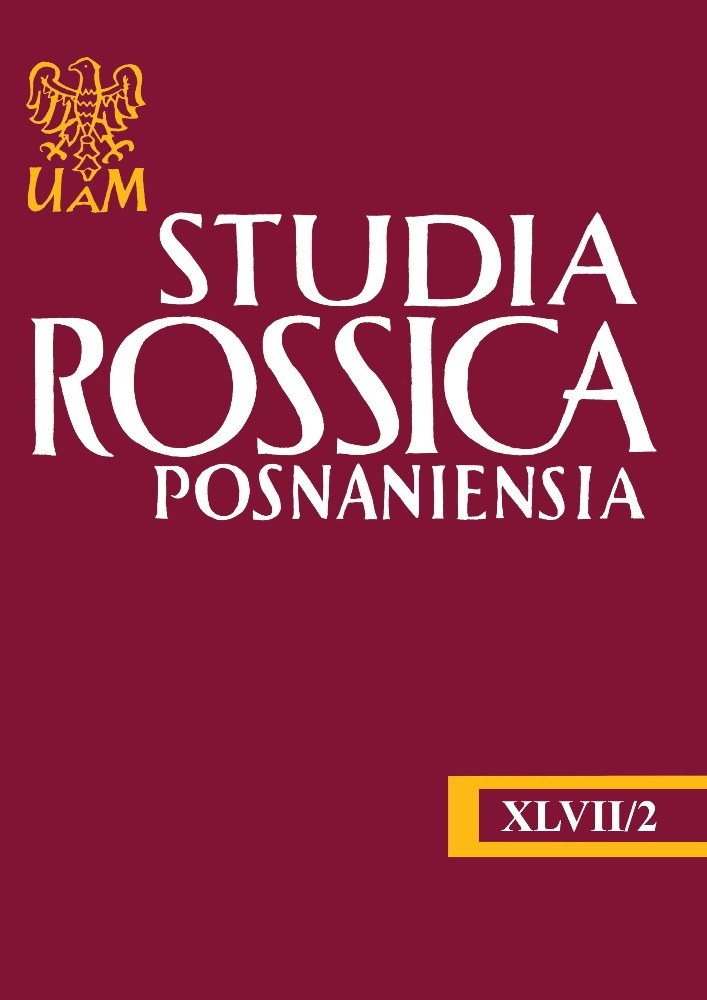Abstrakt
The paper aims at investigating the demonstration of Russian intuition in the contemporary Russian speculative fiction. The research thesis is that the Russians, both presented in literature and within the frames of the national character studies, manifest themselves as the intuitive introvert type according to Carl Gustav Jung’s classification. For validating the thesis, as far as the proposed literary works are concerned, one should use the instruments offered by cultural literary criticism along with the support of non-literary disciplines, such as intercultural communication and ethnopsychology. Moreover, one should consider also notes on Russian national character taken by Jung himself as well as studies on the sociocultural aspect of the analysed works. A wide range of methods and perspectives allows deep research of the “feeling – intuitive” Jungian scale as manifested within literary characters representing the Russian element (also called Russianness) in the selected works, which belong to the most significant and/or popular pieces of contemporary speculative fiction in Russia.
Bibliografia
Černâk, Mariâ. Massovaâ literatura XX veka. Moskva, Flinta, 2013.
Divov, Oleg. Vybrakovka. Moskva, Èksmo, 2016.
Gluhovskij, Dmitrij. Metro 2033. Moskva, AST, 2017.
Jung, Karl. Psihologičeskie tipy. Per. Sofii Lorie. Minsk, Harvest, 2018.
Kasânova, Kseniâ. O russkom nacionalʹnom haraktere. 1993. Web. 11.09.2018. http://www.etnosy.ru/node/502.
Krapivin, Vladislav. Lužajki, gde plâšut skvorečniki. Moskva, Izdatelʹskij Dom Meŝerâkova, 2017.
Lewandowski, Edmund. Charakter narodowy Polaków i innych. Warszawa, Muza, 2008.
Lukʹânenko, Sergej. Nočnoj dozor. Moskva, AST, 2017.
Ožegov, Sergej. Slovarʹ russkogo âzyka. Moskva, Izdatelʹstvo Oniks, 2008.
Rybakov, Vâčeslav. Gravilet „Cesarevič”. Moskva, È, 2018.
Savina, Larisa. „Tema «Deti i vojna» v proizvedeniâh sovremennoj fantastiki”. Izvestiâ Volgogradskogo gosudarstvennogo pedagogičeskogo universiteta, 3, 2015, s. 186-190.
Sergeeva, Alla. Russkie: stereotipy povedeniâ, tradicii, mentalʹnostʹ. Moskva, Flinta, 2012.
Slavnikova, Ol’ga. Â lûblû tebâ, imperiâ. Web. 20.08.2019. http://znamlit.ru/publication.php?id=1308.
Solovʹev, Vladimir. Tajny russkoj duši. Voprosy – otvety – versii. Moskva, Russkij âzyk. Kursy, 2001.
Zdziechowski, Marian. „Wpływy rosyjskie na duszę polską”. Dusza polska i rosyjska (Od Adama Mickiewicza i Aleksandra Puszkina do Czesława Miłosza i Aleksandra Sołżenicyna). Red. Andrzej de Lazari. Warszawa, PISM, 2004, s. 151-176.
Licencja
PRACE PUBLIKOWANE W CZASOPIŚMIE DOSTĘPNE SĄ NA LICENCJI CREATIVE COMMONS:
Uznanie autorstwa-Użycie niekomercyjne-Na tych samych warunkach 4.0 Międzynarodowe.
Autorzy tekstów przyjętych do publikacji w czasopiśmie „Studia Rossica Posnaniensia” są zobowiązani do wypełnienia, podpisania i odesłania na adres redakcji umowy o udzielenie nieodpłatnej licencji do utworów, z zobowiązaniem do udzielania sublicencji Creative Commons.
Zgodnie z umową, autorzy tekstów opublikowanych w czasopiśmie “Studia Rossica Posnaniensia” udzielają Uniwersytetowi im. Adama Mickiewicza w Poznaniu niewyłącznej i nieodpłatnej licencji oraz zezwalają na użycie sublicencji Attribution-NonCommercial-ShareAlike 4.0 International (CC BY-NC-SA 4.0).
Autorzy zachowują prawa do dalszego, swobodnego rozporządzania utworem.
Autorzy, którzy wykorzystują w swoim tekście cudze utwory (np. ilustracje, fotografie) proszeni są o dostarczenie do redakcji czasopisma zgody na publikację.
Użytkownicy internetu uprawnieni są do korzystania z utworów opublikowanych po 2015 roku “Studia Rossica Posnaniensia” tylko w celach niekomercyjnych, pod następującymi warunkami:
https://creativecommons.org/licenses/by-nc-sa/4.0/
Uniwersytet im. Adama Mickiewicza w Poznaniu zachowuje prawo do czasopisma jako całości (układ, forma graficzna, tytuł, projekt okładki, logo itp.).

